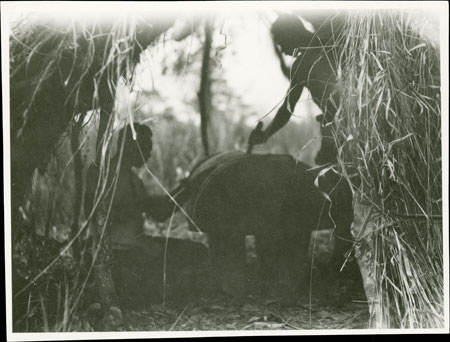Zande gong carving

104 x 78 mm | Print gelatin silver
There are records relating to alternative images that we do not have scans for in the database:
1998.341.161.1 - Negative film nitrate , (104 x 78 mm)
1998.341.161.1 - Negative film nitrate , (104 x 78 mm)
Date of Print:
Unknown
Previous PRM Number:
EP.A.161
Previous Other Number:
66 6
Accession Number:
1998.341.161.2
Description:
Two men inside a shelter carving the surface of a wooden gong (gaza) using a chisel and hammer.
Photographer:
Edward Evan Evans-Pritchard
Date of Photo:
1927 - 1930
Region:
[Southern Sudan] Western Equatoria Yambio
Group:
Zande
PRM Source:
Edward Evan Evans-Pritchard
Acquired:
Donated 1966
Other Owners:
E. E. Evans-Pritchard Collection
Class:
Music , Shelter , Carving , [Dance]
Keyword:
Musical Instrument Drum , Building House Communal
Documentation:
Original catalogue lists in Manuscript Collections. Additional material in related documents files. [CM 27/9/2005]
Primary Documentation:
PRM Accession Records - [1966.27.21] G PROFESSOR E.
E.
EVANS-PRITCHARD; INST.
OF SOCIAL ANTHROPOLOGY, 51 BANBURY RD.
OXFORD - S.
SUDAN, AZANDE TRIBE.
Box of negatives in envelopes.
Nos.
1 - 400
Added Accession Book Entry - [In pencil in column] Catalogue room.
[1966.27.23] G PROFESSOR E. E. EVANS-PRITCHARD; INST. OF SOCIAL ANTHROPOLOGY, 51 BANBURY RD. OXFORD - S. SUDAN, AZANDE TRIBE. Box of prints in envelopes, nos. 1 - 400 (prints of negatives in 1966.27.21)
Manual Catalogues [typewritten, entitled "Zande Photographs (E-P)"] - 161. Making gong. (Poor photograph). 66/6
Added Accession Book Entry - [In pencil in column] Catalogue room.
[1966.27.23] G PROFESSOR E. E. EVANS-PRITCHARD; INST. OF SOCIAL ANTHROPOLOGY, 51 BANBURY RD. OXFORD - S. SUDAN, AZANDE TRIBE. Box of prints in envelopes, nos. 1 - 400 (prints of negatives in 1966.27.21)
Manual Catalogues [typewritten, entitled "Zande Photographs (E-P)"] - 161. Making gong. (Poor photograph). 66/6
Other Information:
In Witchcraft, Oracles and Magic Among the Azande (OUP 1937:101).
E.
E.
Evans-Pritchard notes that 'Their great wooden gongs (gugu, also called borua) are Mbomu.
A smaller kind, karakara...came from beyond the Uele.
The skin drum (gaza, ndimo) is Mbomu." (Man and Woman among the Azande, 1974: 115-116) "..when I [the narrator] went through the settlements I told all the youths about the dance.
Some of them told me "we have already heard the dance-gong, that which you beat in the morning." I said to them "all right, I am most eager to dance today." ...
The master of the dance stayed away for a short time and then he came to where we were and saluted ...
He then went to the homestead of the dance and mounted the gong there.
All stopped dancing.
He spoke to them thus 'it is I, Aramasi, who am giving this dance today to lament my younger brother with it.
...
He then got down from the top of the gong.
Balingbandali mounted the gong [to beat it] and Nambaga took possession of the drums...
the dance began in full swing." In C.G.
& B.
Seligman's Pagan Tribes of the Nilotic Sudan (London, Routledge 1932, page 505) they reproduce a drawing of "Yambio's gong" (which they state is held at Gordon College, now University of Khartoum) with the comment that 'we know of no insignia of kingship among the Azande, though the big wooden gongs, always so far as we know in the shape of a buffalo, were closely associated with the more important chiefs and were regarded with respect because of that association.
Two MP3 format recordings of Zande gongs (although in the Congo instead of the Sudan) (entitled bia gaza ('drum song') are available at: http://ilam.ru.ac.za/home/moa/moa038.htm [Chris Morton 16/10/2003]
Recorder:
Christopher Morton 16/10/2003 [Southern Sudan Project]

